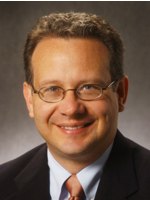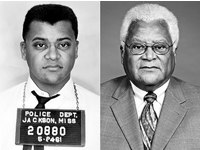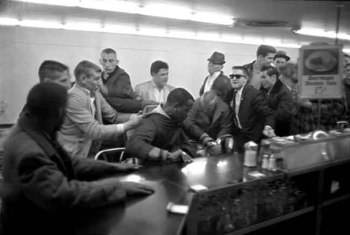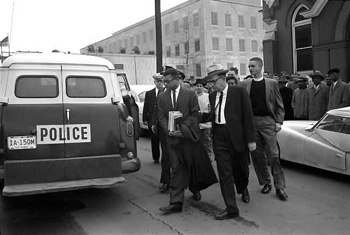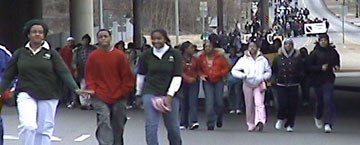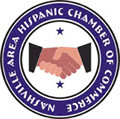
Member of Sheriff's advisory council offers concerns, suggestions for 287(g) program
The Nashville/Davidson County Sheriff is preparing for a program called 287(g), which will provide greater integration with federal immigration resources (see yesterday's story
here). The Sheriff has convened an advisory council with members of the community who have provided comment and concerns about the implementation of such a program.
Rick Caceres is one of the council members, and the Hispanic Nashville Notebook (HNN) interviewed Mr. Caceres about his background, his concerns about the 287(g) program, and how he believes those concerns might be addressed. This is a two-part interview, with the first part appearing below. The second part will be published tomorrow.
HNN: Could you tell us about your background?50-year-old retired entrepreneur, originally from California. My parents were migrant farm workers until World War II, when my father enlisted and after fighting the Japanese, returned home and used the G.I. Bill to get a college degree. My father was an activist and politician, being the first Hispanic to be elected to city government. So, early on I was exposed to "on the ground" tactics, canvassing, voter registration, etc. He was a prolific fundraiser, and I remember working all through my childhood on his various campaigns. He worked with, and raised money for, Caesar Chavez; and we made frequent trips to Mexico to tour "Our Little Brothers and Sisters", which were church-run orphanages that my father contributed to. Anyway, there isn't much remarkable about me, I served in the Army and received Vietnam Veteran Status, even though I traveled no further than Fort Ord, Calif. I owned an insurance brokerage, went broke, until I eventually saved enough money to open a 5000-square-foot restaurant/sports bar. I sold it in 1999 and bought a small horsefarm and am about to open a Bed & Breakfast there. I breed quarterhorses and stay active in Democratic politics and latino causes, as well as GLBT causes. I worked a little with MoveOn, and for Wesley Clark, and then John Kerry. I have a brother and two sisters, and two kids, age 10 and 9.
HNN: Metro Nashville government is contemplating a program by which local law enforcement officers will have the power to review detainees' immigration records and deport them if necessary. Is that a fair characterization of 287(g)? What else would it do? No. In fact, it is a common misconception that there is some sort of accurate real time Federal database that Davidson County and other cities that adopt this program will have access to, and that is simply not the case. The database may very well tell local law enforcement if someone has overstayed a visa or if someone has prior criminal conduct on their record. If that were the sole purpose of the 287(g) program, and if the database accurately depicted a person’s change of status, I might not have a problem with it. However, there are dozens if not hundreds of visas available and it has been my experience that even seasoned immigration attorneys are not familiar with all of them.
You asked what else it would do. If a person without proper documentation has lived and worked and contributed to our community for 10 years, and has had no interaction with the police, and happens to be a passenger in a vehicle stopped by local police, he could possibly be subject to arrest, detainment, and put through the interview process, and ultimately issued an NTA (Notice to Appear), which many immigration attorneys will tell you amounts to a
de facto deportation.
HNN: What involvement do you have in the effort to implement a 287(g) program in Nashville?
I have no interest in implementing the 287(g) program in Nashville. The potential for misuse is enormous, and while I believe that Sheriff Hall and Chief Serpas have the highest ethical standards, this program will outlive them. In a political climate wherein we see a strong anti-immigrant sentiment, this program becomes nothing more than a weapon in a war of attrition.
HNN: How did you get involved?I received a letter from Sheriff Hall’s office asking if I would be interested in serving on an advisory council for the program. My decision to participate was based on the belief that the program’s arrival in Nashville was inevitable, but perhaps as a council member I could at least ensure that information about the program was available to the immigrant community unfiltered.
HNN: What kind of skills and/or experience do you have that adds value to the process?It’s not that I possess skills that are necessarily unique, or that my education and/or training make me more qualified than anyone else, rather I feel I bring many years of personal experience, particularly with respect issues affecting the Hispanic community, and I have been told that I have a gift for communicating, even with those that have an opposing viewpoint. Of course, that may change when this is all said and done!
HNN: What other people are being consulted? Is there anyone or any voice missing that should have been consulted, in your opinion?There are a number of well-qualified, dedicated people serving on this council. Elliot Ozment, Sean Lewis, Yvette Sebelist, and Maria Clara Mejia come to mind. I believe that the absence of some prominent voices within the advocate community is a result of the belief that participation in this effort amounts to tacit approval. That said, besides the obvious human rights issues at stake, there is the potential for debilitating economic consequences to many area businesses, so I am somewhat surprised that there is no representative from the Chamber of Commerce participating. In addition, I feel we may have missed an opportunity to involve the African-American community.
HNN: What is your impression of the way the 287(g) effort is being handled here in Nashville, including the process that brought you to the table?It’s a mixed bag. I am pleased that Sheriff Hall has attempted to make the process transparent; after all, he is not required to involve leaders in the immigrant community. However, part of me is uncomfortable with what appears to be a political tactic of calling attention to this proposed program without more consultation with those same leaders. Good public policy is a result of candid dialogue between those who may ultimately be affected by it. I would hate to think that this program merely provides an opportunity for those seeking office to point to as evidence of their commitment to the greater good.
HNN: You visited North Carolina to see how 287(g) is being implemented there. Have things changed over there, and for the better?I suppose that depends upon who you ask. The advocacy groups I interviewed while there were not at all happy with the abuses of power that came along with this program. This is where it gets a little sticky: Sheriff Hall likes to say that he has no control over who winds up in his jail, and he is correct in saying so. Much like Mecklenburg County, North Carolina, the sheriff’s department has no arrest authority. The program, as implemented in Mecklenburg County, leaves little room for discretion; that is to say that the protocols or processes simply kick in once a person is deemed to be foreign born. So, I asked the training sergeant the obvious question, which was, “If a person indicates that they were born in El Paso, Texas, for instance, would this preclude them from being put through the interview process?” His reply was, “Yes, provided the intake officer had no reason to suspect otherwise.” Naturally, I asked what might draw suspicion. “Not speaking English would be a good indicator.” he replied. I found that alarming. That means that any meaningful discretion will be exercised by the police at the street level. In North Carolina, there have been reports of people subjected to arrest and ultimately put through the process for REPORTING crimes to the police. I can’t say what affect the program has had on the lives of average Mecklenburg County residents.
HNN: Most immigrants, plus their families, their friends, and their advocates disagree with the U.S. immigration laws that treat ordinary people like dangerous criminals. Is it possible to view programs like 287(g) as a blessing in disguise, in that it is a model for a nationwide immigration policy, one that focuses on the dangerous criminals instead of ordinary people? Do you disagree that violent immigrants should be detained and, if necessary, deported? Why wouldn't 287(g) be useful in this context?Let’s answer that last question first. I believe you would be hard pressed to find a single immigrant or immigrant advocate that doesn’t believe in incarcerating or deporting criminals. The people living along Nolensville Road want the same things for their community that those living along West End Avenue want. In fact, in the entire debate about immigration and immigration reform, this fact often goes unmentioned. Long before we elected to divide our neighbors and co-workers based on their residency status, they were people, with families, with dreams, aspirations, and yes, flaws.
The problem with programs like the 287(g), is that yet again, it is plainly punitive in its scope. Instead of engaging the immigrant community, and establishing an environment of trust, coupled with a frank discussion of the issues at stake, we seem to focus on knee-jerk proposals that have the effect of driving these people further into the shadows. Any real comprehensive and viable immigration reform will require the cooperation of the immigrant community. I wonder how we will achieve this, when we imply that they are first and foremost perceived as criminals.
HNN: If you were given carte blanche to implement a program like 287(g), with whatever modifications you felt were appropriate, what would it look like?That’s a good question. In fact, while certainly not being carte blanche, the members of the council will submit their recommendations and ideas to Sheriff Hall and his staff on January 10th. A partial list of recommendations I have include a minimum amount of bilingual deputies on duty each shift, and at the very least, cultural diversity training for those officers who are not bilingual. In addition, and perhaps most important, are clear-cut provisions that determine who is detained and who is issued an NTA. I believe that the program should be monitored by civilian oversight.
I have found Chief Serpas to be incredibly accessible and his office seems to make good use of statistical data. He seems willing to provide those statistics that might point to rogue street-level police so that they may be disciplined and/or terminated. If he continues that trend, it should go a long way toward re-establishing trust and two-way communication between the community and the Police Department. Unfortunately, that is the only possibly upside I see today.
HNN: Are you being heard? Are there others who share your concerns? Are you participating on behalf of any organization, or on your own?Much to my chagrin, I have a reputation for being the proverbial squeaky wheel, and I have done some interviews like this one in the press, so I suppose I am being “heard”. But that isn’t really the point. The people I most want to hear OUR concerns are Sheriff Hall, Chief Serpas, and the Metro Council, and it’s too early to know.
As for others who might share these concerns, I’ll probably tweak some people when I say this, but yes, of course there are, and I wonder why they see fit to remain silent, because silence, to me, is tacit approval. If you think about it, this program, improperly implemented, and without real oversight, and coupled with the suspension of the Driving Certificate program, could have a devastating effect on area businesses whether or not they employ an immigrant workforce.
HNN: You have said that 287(g) is much more dangerous to the Hispanic community than the language ban currently being considered by the Metro Council. Why is that?No question. The bill proposed by Councilman Crafton was an obvious political ploy, more symbolic than anything. I was thrilled to see how many council members took the time to educate themselves on the long-term effects of that bill. Even if the bill had passed without changes, perhaps the worst thing that could happen is that some non-English speaking person would be turned away when seeking to interact with local government. Bad enough, but hardly the nightmare of indefinite detainment and separation from loved ones that this program will surely produce.
You say that you think 287(g) is a weapon in a war of attrition. What do you mean, and why is that a problem?
You mentioned "obvious human rights issues" and "indefinite detainment and separation from loved ones" - is that the problem, or is there more to it? If that's it, what exactly are the human rights issues?
You said that perhaps as a council member you could at least ensure that information about the program was available to the immigrant community unfiltered. What kind of unfiltered information are you talking about?
You mentioned the need for policies - requiring a minimum amount of bilingual deputies on duty each shift, and at the very least, cultural diversity training for those officers who are not bilingual, and in addition, clear-cut provisions that determine who is detained and who is issued an NTA, and civilian oversight - who can
implement those policies?
And more...
 TennesseeAhora.com announced that internationally renowned multicultural evangelist Luis Palau is coming to Christ Church this Sunday. One purpose of Palau's visit is to generate support for the Nashville CityFest, an evangelism festival scheduled for May 19 & 20, according to this calendar.
TennesseeAhora.com announced that internationally renowned multicultural evangelist Luis Palau is coming to Christ Church this Sunday. One purpose of Palau's visit is to generate support for the Nashville CityFest, an evangelism festival scheduled for May 19 & 20, according to this calendar. This non-traditional evangelism is what makes Palau's festivals so attractive, especially to young people. The events include full multi-media productions featuring some of the biggest names in Christian music. In each city, a large skate park is also set up that showcases some of the top athletes in extreme sports such as skateboarding, BMX and motocross. These events are hosted by actor Stephen Baldwin. The festival does not leave out the children. There is also a big play area and family fun zone that includes some favorite VeggieTales.
This non-traditional evangelism is what makes Palau's festivals so attractive, especially to young people. The events include full multi-media productions featuring some of the biggest names in Christian music. In each city, a large skate park is also set up that showcases some of the top athletes in extreme sports such as skateboarding, BMX and motocross. These events are hosted by actor Stephen Baldwin. The festival does not leave out the children. There is also a big play area and family fun zone that includes some favorite VeggieTales.

 Amy Napier Viteri at WKRN produced
Amy Napier Viteri at WKRN produced  From the
From the 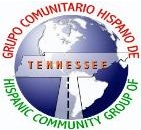 The Hispanic Community Group of Tennessee (HCGT) issued this press release announcing the opening of its Progreso Community Center:
The Hispanic Community Group of Tennessee (HCGT) issued this press release announcing the opening of its Progreso Community Center: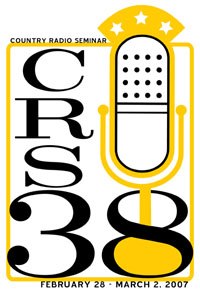








 Dr. Miguel R. Ruiz-Avilés will speak, in Spanish, on Medieval Spain as a model of religious tolerance for the present day at Charlemos Spanish on Thursday 25 January. Charlemos Spanish meets the second and fourth Thursday of the month from 7:00 p.m. to 8:30 p.m. at Palette Gallery and Cafe at 2119 Belcourt Avenue in Hillsboro Village. The event is free and open to the public.
Dr. Miguel R. Ruiz-Avilés will speak, in Spanish, on Medieval Spain as a model of religious tolerance for the present day at Charlemos Spanish on Thursday 25 January. Charlemos Spanish meets the second and fourth Thursday of the month from 7:00 p.m. to 8:30 p.m. at Palette Gallery and Cafe at 2119 Belcourt Avenue in Hillsboro Village. The event is free and open to the public.


